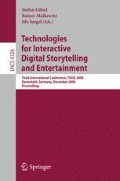Abstract
Personalizing the playing experience is a key factor in making players of computer games feel involved in the virtual world; however, current Massively Multiplayer Online Role Playing Games only to a limited degree allocate development or running resources towards facilitating a personalized experience. In Pen and Paper Role Playing Games, the player-controlled characters form a key component in facilitating the formation of a personalized experience. In these games, characters are often more than the association of stats and skills popular in online games, and several approaches towards utilizing the character-based information directly to personalize the game playing have been developed, e.g. personality systems. Some of these systems can be integrated into online games, providing a realistic and financially feasible method for improving the ability of these games to personalize the experience to the individual players.
Access this chapter
Tax calculation will be finalised at checkout
Purchases are for personal use only
Preview
Unable to display preview. Download preview PDF.
References
Bartle, R.: Designing Virtual Worlds. New Riders Games, Berkeley (2003)
Combs, N.: The Intelligence in the MMOG: from scripts to stories to directorial AI. In: Proceedings of Other Players Conference, IT University, Copenhagen (2005)
Crawford, C.: Chris Crawford on Interactive Storytelling. New Riders Games, Berkeley (2005)
Edwards, R.: GNS and Other Matters of Roleplaying Theory, Adept Press (2001) (accessed July 11, 2006), Online publication http://www.indie-rpgs.com/articles/1/
Eladhari, M., Lindley, C.: Story Construction and Expressive Agents in Virtual Game Worlds. In: Proceedings of the Other Players Conference, Copenhagen, Denmark (2004)
Hallford, N., Hallford, J.: Swords & Circuitry: A Designer’s Guide to Computer Role Playing Games. Prima Tech., Roseville (2001)
Klug, C.: Implementing Stories in Massively Multiplayer Games (2002) (accessed July 11, 2006), Online publication http://www.gamasutra.com
Mackay, D.: The Fantasy Role-Playing Game: A New Performing Art. McFarland & Co., Jefferson (2001)
Mateas, M.: Expressive AI: Games and Artificial Intelligence. DiGRA Level Up, Utrecht, Holland (2003)
Montola, M.: Designing Goals for Online Role-Players. In: Proceedings of the DiGRA Conference (2005)
Murray, J.H.: Hamlet on the Holodeck – The Future of Narrative in Cyberspace. The MIT Press, Cambridge (1997)
Peinado, F., Gervás, P.: Transferring GMing Laws to Interactive Digital Storytelling. In: Göbel, S., Spierling, U., Hoffmann, A., Iurgel, I., Schneider, O., Dechau, J., Feix, A. (eds.) TIDSE 2004. LNCS, vol. 3105, pp. 48–54. Springer, Heidelberg (2004)
Salen, K., Zimmerman, E.: Rules of Play - Game Design Fundamentals. MIT Press, London (2004)
Tosca, S.: Role-playing in multiplayer environments. The Masquerade, Vampire, Redemption. Computer Games & Digital Textualities, Copenhagen, Denmark (2001)
Tosca, S.: The Quest Problem in Computer Games. In: Göbel, S., Spierling, U., Hoffmann, A., Iurgel, I., Schneider, O., Dechau, J., Feix, A. (eds.) TIDSE 2004. LNCS, vol. 3105, pp. 48–54. Springer, Heidelberg (2004)
Trappl, R., Petta, P. (eds.): Creating Personalities for Synthetic Actors: Towards Autonomous Personality Agents. Springer, Berlin (1997)
Tychsen, A., Hitchens, M., Brolund, T., Kavakli, M.: The Game Master. In: Proceedings of the Interactive Entertainment Conference, pp. 215–222 (2005)
Tychsen, A., Pagden, N.: Making Magic! Enhancing PnP RPGs with computing technology. Playing Roles seminar, Tampere, Finland (2006)
Yee, N.: Motivations of Play in Online Games. CyberPsychology and Behavior (in press)
Author information
Authors and Affiliations
Editor information
Editors and Affiliations
Rights and permissions
Copyright information
© 2006 Springer-Verlag Berlin Heidelberg
About this paper
Cite this paper
Tychsen, A., Tosca, S., Brolund, T. (2006). Personalizing the Player Experience in MMORPGs. In: Göbel, S., Malkewitz, R., Iurgel, I. (eds) Technologies for Interactive Digital Storytelling and Entertainment. TIDSE 2006. Lecture Notes in Computer Science, vol 4326. Springer, Berlin, Heidelberg. https://doi.org/10.1007/11944577_26
Download citation
DOI: https://doi.org/10.1007/11944577_26
Publisher Name: Springer, Berlin, Heidelberg
Print ISBN: 978-3-540-49934-3
Online ISBN: 978-3-540-49935-0
eBook Packages: Computer ScienceComputer Science (R0)

